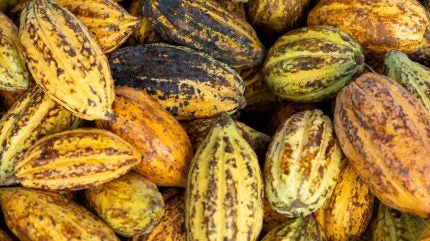
A group of shareholders have called on global chocolate heavyweights, including Hershey and Lindt & Sprüngli, to improve cocoa farmer pay within their supply chains.
The investor letter, issued yesterday (20 May) by non-profit Investor Advocates for Social Justice (IASJ), called on some of the world’s largest chocolate makers “to end exploitative purchasing practices”, particularly in Ghana and Côte d’Ivoire.

Discover B2B Marketing That Performs
Combine business intelligence and editorial excellence to reach engaged professionals across 36 leading media platforms.
The letter, which was also directed to Ferrero, Mars Mondelez International and Nestlé, has called on the companies to provide all cocoa farmers with a “living income” by the end of 2025.
The investor group also demanded support for “cocoa farmer resilience and security” by establishing long-term working contracts.
Boosting farmer incomes will help address the “root cause” of child labour, the IASJ said.
It will also help to ensure continued stability of the cocoa sector, by preventing farmers from leaving the sector altogether for better pay.

US Tariffs are shifting - will you react or anticipate?
Don’t let policy changes catch you off guard. Stay proactive with real-time data and expert analysis.
By GlobalDataIn April, a report on Nestlé’s income accelerator for cocoa farmers in Côte d’Ivoire found pay had gone up but had fallen short of a benchmark for living incomes.
According to the IASJ, chocolate producers have “repeatedly deflected investors’ requests for them to ensure cocoa farmers receive a higher farmgate price, by stating that the governments of Ghana and Côte d’Ivoire are responsible for setting the price for cocoa”.
Those countries do set prices. However, the investors said chocolate companies can still “pay sustainability premiums on top of the government-set price which are received directly by cocoa farmers”.
In a statement, IASJ program director Aaron Acosta said: “We’re calling on chocolate companies to use their purchasing power, through price interventions, to ensure cocoa farmers receive a living income. Because of their size and influence, chocolate companies are uniquely positioned to address systemic poverty by ensuring cocoa farmers receive a living income.”
In recent weeks, Côte d’Ivoire and Ghana, the two largest producers of cocoa worldwide, have raised their farmgate prices for the commodity.
This year, cocoa futures have hit record highs due to pressure on global supplies from crop disease and poor weather. Some confectioners have also pointed to regulation, including the planned new EU laws covering deforestation, as well as market speculation, for playing a role in fuelling prices.
Just Food has contacted Ferrero, Hershey, Lindt, Mars, Mondelez and Nestlé for comment.
A Nestlé spokesperson said: “We believe cocoa farmers should earn an income enabling them to maintain a decent and adequate standard of living for themselves and their families.”
The spokesperson pointed to Nestlé’s income accelerator, adding the programme “is helping cocoa farmers to substantially improve cocoa productivity as well as increase their net income”.
The spokesperson added: “We are continuing to gather feedback from the farming families, to learn and adapt the programme accordingly.
“These financial incentives are on top of the support provided by the governments of Côte d’Ivoire and Ghana that Nestlé pays and premiums Nestlé offers for certified cocoa.”
The other companies had not responded to Just Food‘s requests for comment at the time of writing.





